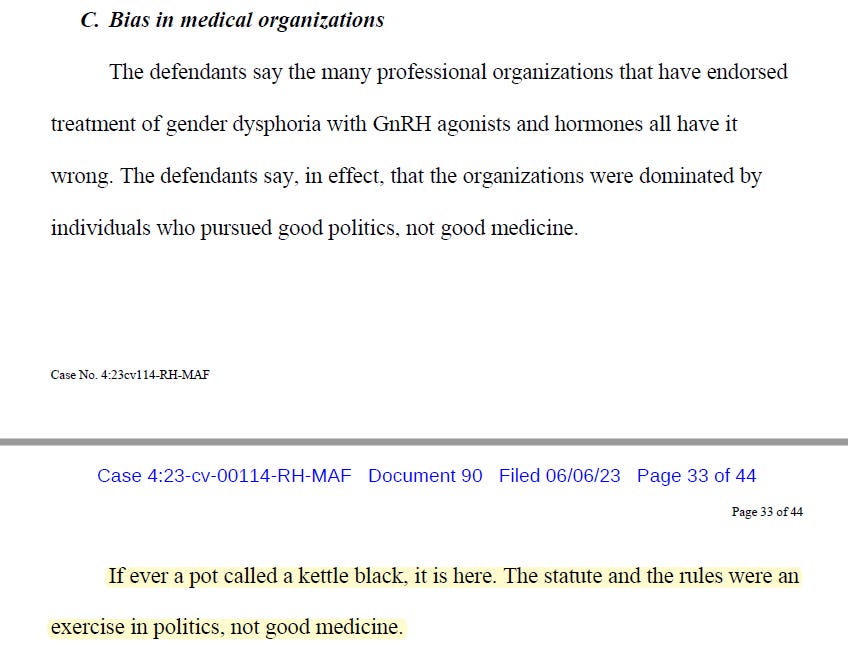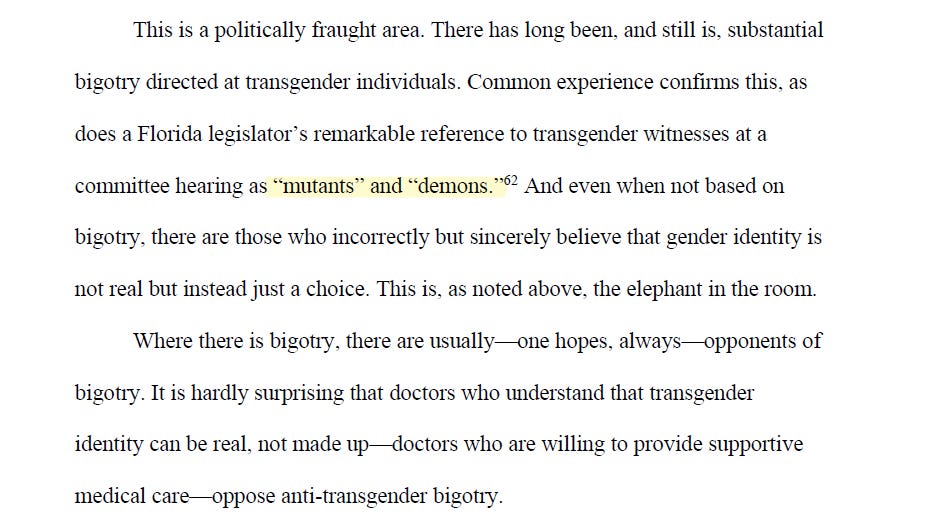Florida Judge Blocks Trans Ban: 5 Scathing Remarks That Will Be Cited Everywhere
A massive legal victory emerged out of Florida this morning. In a scathing rebuke, Florida Judge Hinkle used legislators own statements against them and partially blocked the trans care ban there.
In a significant legal ruling, a federal judge put a stop to Florida's ban on gender-affirming care for transgender youth. The lawsuit, originating in the Northern District of Florida, challenged both the medical board's prohibition of such care and SB254, a bill which entrenched this ban into law, while extending its reach to adult trans care. Today's scathing decision, delivered by Judge Hinkle, asserts the ban as likely unconstitutional, thus blocking its enforcement. His 44-page ruling, though initially limited, is anticipated to broadly apply to trans youth who need care in Florida, paving the way for the resumption of such care in the near future.
The landmark decision itself will be cited for years to come, not just for its impact but also for the judge’s full throated repudiation of these kinds of policies. Judge Hinkle pulled no punches in calling out the law, stating that it was an exercise in bigoted political targeting of a minority. He used the lawmakers’ own statements against them in the order, showing the importance of getting conservatives on the record with respect to these laws to prove discriminatory intent.
The entire ruling is long and worth reading, but here are the five most significant and scathing sections that will be referenced in legislative hearings and courtrooms around the United States:
5. Bias In Medical Organizations: “The Pot Calls The Kettle Black”
The entire section is worth reading in the original court document. The state argued that every major medical organization is “biased” in approving gender affirming care. Meanwhile, they tapped doctors from organizations like the American College of Pediatricians, a fake-science organization known for supporting conversion therapy. Court documents showed that doctors from the American College of Pediatricians manipulated research findings for the state of Florida in order to arrive at the final conclusion of “care is banned.”
The judge was having none of it. In evaluating the medical organizations’ support of gender affirming care vs. the groups that Florida relied on to oppose gender affirming care, he called out the statement of medical bias as “the pot calling a kettle black.” Ultimately, he ruled that the overwhelming majority of doctors in these organizations are dedicated to caring for their patients, and that these organizations were motivated by that and that alone in their findings.
4. Lawmakers Statements Come Back To Bite Them
The judge pulled no punches when he resurrected lawmakers own statements to prove their discriminatory intent with passing this bill. Earlier in the year, a Florida GOP lawmaker, Representative Webster Barnaby, referred to transgender people as “demons, mutants, and imps.” Numerous references to transgender people in a derogatory and discriminatory were made in the hearings, as they have been made in statehouses across the country. It turns out that getting the anti-trans Republicans on the record with their statements helped block the bill in court.
Judge Hinkle not only referenced the comments, but called them out openly as an exercise in overt bigotry. He contrasted the statements of lawmakers opposing the care with doctors, who are acting in a professional manner to alleviate the suffering of gender dysphoria.
3. Regret Is Rare: Florida Could Not Even Produce A Witness Regretting Care
Anti-trans witnesses and organizations have repeatedly asserted that most trans youth “desist” from identification as trans. They use faulty and old studies to claim that gender affirming care has high regret rates - often citing a heavily debunked 80% figure. When analyzing the record of detransition and regret in the court, the court found that regret is not common. Stunningly, regret is so uncommon that the state of Florida could not even produce a single witness who has regretted care.
Instead, the judge pointed to more recent studies showing a 98% persistence rate among transgender youth. He also noted that the risks of misdiagnosis of gender affirming care are not unlike many other forms of healthcare. He closed off by saying that difficult diagnoses do not call for one-size-fits-all bans, and that many other conditions, especially mental health conditions, are routinely diagnosed without objective tests and treated with powerful medications.
2. Parental Rights Arguments Support Trans Care
Throughout this legislative cycle, Republicans have argued in favor of passing anti-trans school bills, “Don’t Say Gay or Trans” laws, and bathroom bills under the guide of parental rights. They claim that we should forcibly out transgender kids to their parents so that parents could proceed to detransition their kids. However, there's a contradictory stance when it comes to trans youth, as they assert that parents should not possess the right to change their child’s pronouns at school, attend family-friendly drag events with them, or seek medically essential care. It is therefore ironic that in the first major test of parental rights around gender identity, it is transgender people who won on parental rights claims.
The judge points out that by blocking parents from controlling their children’s medical care, the government of Florida violated their rights as parents. There is sizeable precedent behind this right, which stems from interpretations of due process rights guaranteed by the United States constitution. Because the state showed no rational basis to ban gender affirming care, Florida’s law is likely unconstitutional on this ground.
1. “Gender Identity Is Real”
One of the most profound statements in the court documents was also one of the simplest: “gender identity is real.” This statement, obvious to anybody who knows a trans person or is trans themselves, has nonetheless been challenged and disputed by anti-trans organizations. Transgender people are often painted as a “fad,” a “choice,” or a “social contagion.” Judge Hinkle firmly establishes on the record that this is not the case, proclaiming and using as the basis for the rest of his decision that gender identity is real.
This is a profound and impactful statement. If gender identity is real and if trans people are indeed telling the truth about this being an integral part of who they are, then discriminating against transgender people is firmly unconstitutional. The judge, later in the order, held the defense’s feet to the fire, stating:
Any proponent of the challenged statute and rules should put up or shut up: do you acknowledge that there are individuals with actual gender identities opposite their natal sex, or do you not? Dog whistles ought not be tolerated.
This simple statement will underpin the resistance against transgender discrimination in courtrooms across the country. Transgender people are who they say they are, and their rights are worth protecting.









A huge win for humanity! Now for the remainder of the red states to follow suit!
I’m so happy this now exists. I love that their outright bigotry is documented in this ruling as well